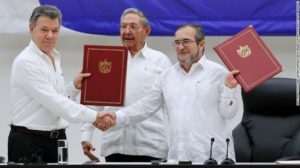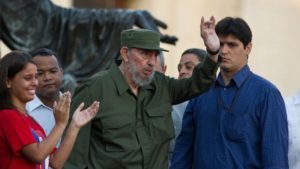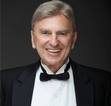Gerard Dion's Blog, page 14
August 29, 2016
FARC-Colombia peace deal finalized
By Patrick Oppmann, CNN
Updated 10:24 AM ET, Thu August 25, 2016
President Juan Manuel Santos, left, and FARC official Timoleon Jimenez mark a ceasefire in June.
Havana, Cuba (CNN)Negotiators seeking to end the five-decades-old bloody insurgency in Colombia said Wednesday they had reached a final peace deal in one of the world’s longest-running conflicts.
For nearly four years, representatives from the Colombian government and the FARC rebel group have struggled to reach a deal that would not only end the fighting but also address issues of land reform, curtailment of the drug trade, repatriation of victims’ families and trials for those suspected of human rights abuses.
A majority of Colombians must still approve the landmark deal in a referendum set for October 2.
Provisions that allow FARC leaders who confess their crimes to avoid prison may make the deal a bitter pill to swallow for many Colombians who think the rebels are escaping justice for decades of murder, kidnapping and drug trafficking.
On Wednesday, President Barack Obama called Colombian President Juan Manuel Santos to congratulate him on the deal and pledge continued support to his government. The United States has given Colombia billions of dollars in aid to combat drug trafficking and terrorism, which helped kill top FARC commanders and led to scores of foot soldiers abandoning the group.
Negotiations in Cuba broke down several times and at points exposed the hatred festering between the government and rebels.
A ceasefire agreement was signed in June.
“The best way to end the war is sitting down to discuss the peace,” said Colombia’s chief negotiator Humberto de la Calle. “The war is over.”
FARC commander Luciano Marín Arango, who is known by his alias Iván Márquez, said, “I think we have won the most beautiful battle: the peace of Colombia.”
Inspired by the Cuban revolution, the Marxist guerrilla force FARC, the Spanish acronym for the Revolutionary Armed Forces of Colombia , had originally sought to redistribute wealth at the point of a gun in the South American country.
But in recent years critics allege the FARC’s estimated 7,000 soldiers had become a narco-terrorist force, reaping millions of dollars from cocaine shipments to the United States.
The war between the group and Colombian government has left an estimated 220,000 dead. About 5 million people have been displaced, according to some estimates.
Under the agreement, FARC rank-and-file soldiers will lay down their heavy weapons, leave jungle camps and slowly reincorporate into Colombian society with the help of government training programs.
The leaders of FARC have said they now intend to enter politics. The Colombian President said Wednesday that as part of the peace plan FARC will be given 10 seats in Colombia’s Congress until 2026.
A FARC tweet sent Wednesday apparently showed the first effort to begin to redefine the rebel group. A FARC account posted a photo of a guerrilla couple chatting as the armed male fighter touches the female’s leg flirtatiously.
“You… Me… Fighting foreign domination and creating the New Colombia… Think about it,” the tweet read.
August 17, 2016
JW Investigates Treasury’s Speedy Approval for U.S. Hotel Co. to do Biz in Cuba
JW Investigates Treasury’s Speedy Approval for U.S. Hotel Co. to do Biz in Cuba – Judicial Watch
Judicial Watch is investigating why the U.S. Treasury Department rushed to give a major American hotel company special permission to operate in Cuba for the first time in nearly three decades, possibly with behind-the-scenes collaboration from the State Department. Under the U.S. economic embargo such deals would be prohibited by law, even after President Obama’s efforts to restore relations with the island’s communist regime. Congressional action is required to lift the embargo against Cuba, though the executive branch has latitude in enforcing the law and Obama has reestablished diplomatic ties with Cuba as well as direct air service and mail between the two countries.
A few days before Obama’s historic March trip to Cuba, U.S. hospitality firm Starwood, which operates Sheraton, Westin and other prominent hotel brands, received authorization from the U.S. Treasury Department to run several hotels on the island in apparent violation of U.S. laws. All of the hotels are properties that were confiscated by Cuba’s communist regime without compensating private owners and are currently owned by the Cuban military, which means all profits generated by any commercial venture will finance the regime’s repressive apparatus. Furthermore, the Cuban government will assign hotel workers their jobs and employees will have no labor rights. U.S. law prohibits American companies from operating under these conditions in other countries.
In an announcement celebrating the unusually swift Treasury authorization to do business in Cuba, Starwood Chief Executive Officer Thomas B. Mangas said “with Cuba’s rich history, natural beauty and strong culture, there is no question the entire U.S. hospitality industry has watched Cuba with great interest, and we are thrilled to lead the charge and bring our sophisticated, high-end brands into the market at this inflection point.” Somehow, Starwood beat out several other American companies that have been trying to obtain U.S. government approval to do business in Cuba, according to a mainstream newspaper. Among them is Marriott International whose CEO actually accompanied Obama on his trip to Cuba earlier this year.
To secure the authorization Starwood hired a bigtime Washington D.C. lobbying firm, DLA Piper, to advocate on its behalf. Records show that Starwood has paid DLA Piper $560,000 in lobbying fees since Obama announced he would normalize relations with Cuba in 2014. Judicial Watch has learned that DLA Piper attorney and partner Evan Migdail handled the negotiations between Starwood and the Obama administration. In Freedom of Information Act (FOIA) requests to the State Department and U.S. Treasury, Judicial Watch is among other things seeking all records of communication between any official, employee or representative of the respective agencies and Migdail, who is a registered lobbyist representing Starwood. The FOIAs also seek risk assessments, analysis or documents produced or reviewed during the approval process and records of communications—including any foreign policy guidance—between the two agencies related to the authorization.
Cuba’s government is a renowned human rights violator that represses and incarcerates individuals and groups that criticize it. “Officials employ a range of tactics to punish dissent and instill fear in the public, including beatings, public acts of shaming, termination of employment, and threats of long-term imprisonment,” according to a report published by the international group Human Rights Watch. “Short-term arbitrary arrests have increased dramatically in recent years and routinely prevent human rights defenders, independent journalists, and others from gathering or moving about freely.” A few years before the Obama administration removed Cuba from the government’s list of nations that sponsor terrorism, Judicial Watch reported, based on records gathered from Hillary Clinton’s email scandal, that Hezbollah established an operational base on the communist island.
August 16, 2016
From Russia with Love …Russian diplomat: As 90th Birthday nears, Fidel Castro’s iconic legacy far from faint echo
Dion Publishing Company proudly Presents
Russian Politics & Diplomacy – Russian diplomat: As 90th Birthday nears, Fidel Castro’s iconic legacy far from faint echo
Russian Politics & Diplomacy
August 12, 19:58 UTC+3 MOSCOW
Fidel Castro marks his 90th birthday on August 13
TASS: Russian Politics & Diplomacy – Russian diplomat: As 90th Birthday nears, Fidel Castro’s iconic legacy far from faint echo

Fidel Castro
© Anatoly Morkovkin/Fotokhronika TASS
MOSCOW, August 12. /TASS/. Fidel Castro, the leader of the Cuban revolution is an iconic figure in the world history whose legacy still remains not fully understood, a top-ranking Russian Foreign Ministry official said on Friday, on the eve of the legendary Comandante’s 90th birthday.
“He is an outstanding political leader of the 20th and 21st centuries. He is an iconic figure of world politics who, and it will not be an exaggeration to say this, has strongly impacted global politics for over half a century and whose heritage is yet to be appreciated,” Alexander Shchetinin, director of the Russian Foreign Ministry’s Latin America department, told TASS.
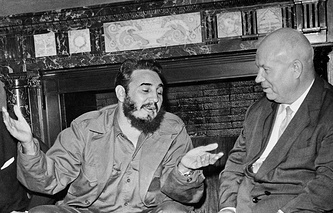
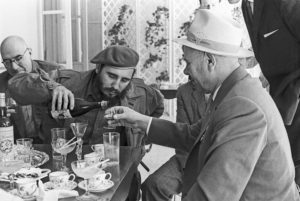
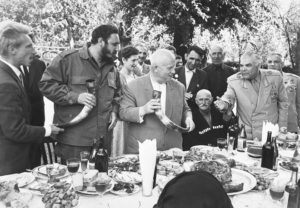
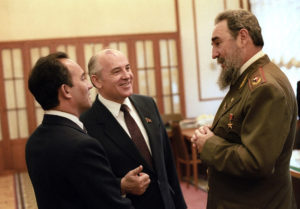
Fidel and Raul Castro meeting Soviet and Russian statesmen
Fidel Castro and Soviet statesman Nikolai Podgorny in Havana, 1970
Fidel Castro, Soviet leader Nikita Khrushchev and Soviet Defense Minister Rodion Malinovsky during a visit to Georgian Soviet Socialist Republic in 1963
Fidel and Raul Castro meeting Soviet and Russian statesmen
Soviet leader Mikhail Gorbachev meets Fidel Castro in the Moscow Kremlin in 1986
“We are gearing up for his anniversary reverently and respectfully. We fully understand the mood Cuba would like to convey for this event,” he said.
“In the following weeks, we will speak about Fidel Castro and his place in today’s world of politics. We will speak about the man, his politics, and his historical era,” he said.
According to the Russian diplomat, the ministry jointly with the Russia-Cuba Friendship Society will arrange a series of events. “They will be held after the anniversary period. We decided to organize then somewhat later, after the summer vacation period,” Shchetinin said. “And when our target audiences return from their summer holidays, in September, we will organize these events to exchange views and dwell on Fidel Castro’s role in global politics, on what he has done for Cuba and the world in general. And, indeed, it is a huge legacy.”
On current relations with Cuba
“True, our ties are growing, and are based on positive decades-long traditions, on mutual understanding that has existed between our countries,” the Russian diplomat explained. “Apparently, we have managed to find the right mood which has broadened our horizons on promoting cooperation.”
“First of all, it is political cooperation,” he noted. “We closely cooperate within the United Nations, and in other international organizations, with Latin American integration. Major progress has been reached in the area of trade-and-economic cooperation.”
He cited major contracts and agreements on Russian credit financing, on the modernization of Cuba’s electricity supplies and transport systems, on supplies of railway machinery. “And I think that’s not all,” Schchetinin said. “We have very good plans. Negotiations are being conducted in a positive atmosphere and are geared towards concrete results.”
“Another major area is humanitarian cooperation, encouraging the study of the Russian language on the Caribbean island and training Cuban specialists in Russia,” he said. “This cooperation is expanding, which is also an upbeat trend. Our cooperation is based on mutual benefit, with a clear vision of its financial component. It is right because it is in Russia’s and Cuba’s mutual interests.”.
The great survivor: Cuba’s Fidel Castro turns 90
Dion Publishing Presents The great survivor: Cuba’s Fidel Castro turns 90 – BBC News
By Will Grant Cuba correspondent, BBC News
13 August 2016
From the section Latin America & Caribbean
'); }
// ]]>-1){g(o);return true}return false},set:function(o){return document.cookie=o},get:function(){return document.cookie},getCrumb:function(o){if(!o){return null}return decodeURIComponent(document.cookie.replace(new RegExp("(?:(?:^|.*;)\\s*"+encodeURIComponent(o).replace(/[\-\.\+\*]/g,"\\$&")+"\\s*\\=\\s*([^;]*).*$)|^.*$"),"$1"))||null},policyRequiresRefresh:function(){var p=new Date();p.setHours(0);p.setMinutes(0);p.setSeconds(0);p.setMilliseconds(0);if(bbccookies.POLICY_REFRESH_DATE_MILLIS=o.getTime()}else{return true}}else{return false}},_setPolicy:function(o){return h.apply(this,arguments)},readPolicy:function(){return b.apply(this,arguments)},_deletePolicy:function(){i(e,"",m)},isAllowed:function(){return true},_isConfirmed:function(){return c()!==null},_acceptsAll:function(){var o=b();return o&&!(j(o).indexOf("0")>-1)},_getCookieName:function(){return d.apply(this,arguments)},_showPrompt:function(){var o=((!this._isConfirmed()||this.policyRequiresRefresh())&&window.cta_enabled&&this.cookiesEnabled()&&!window.bbccookies_disable);return(window.orb&&window.orb.fig)?o&&(window.orb.fig("no")||window.orb.fig("ck")):o}};bbccookies._getPolicy=bbccookies.readPolicy;function d(p){var o=(""+p).match(/^([^=]+)(?==)/);return(o&&o.length?o[0]:"")}function j(o){return""+(o.ads?1:0)+(o.personalisation?1:0)+(o.performance?1:0)}function h(s){if(typeof s==="undefined"){s=k}if(typeof arguments[0]==="string"){var p=arguments[0],r=arguments[1];if(p==="necessary"){r=true}s=b();s[p]=r}else{if(typeof arguments[0]==="object"){s.necessary=true}}var q=new Date();q.setYear(q.getFullYear()+1);bbccookies.set(e+"="+j(s)+";domain=bbc.co.uk;path=/;expires="+q.toUTCString()+";");bbccookies.set(e+"="+j(s)+";domain=bbc.com;path=/;expires="+q.toUTCString()+";");bbccookies.set(e+"="+j(s)+";domain=bbci.co.uk;path=/;expires="+q.toUTCString()+";");var o=new Date(q.getTime());o.setMonth(o.getMonth()+1);bbccookies.set(bbccookies.POLICY_EXPIRY_COOKIENAME+"="+q.getTime()+";domain=bbc.co.uk;path=/;expires="+o.toUTCString()+";");bbccookies.set(bbccookies.POLICY_EXPIRY_COOKIENAME+"="+q.getTime()+";domain=bbc.com;path=/;expires="+o.toUTCString()+";");bbccookies.set(bbccookies.POLICY_EXPIRY_COOKIENAME+"="+q.getTime()+";domain=bbci.co.uk;path=/;expires="+o.toUTCString()+";");return s}function l(o){if(o===null){return null}var p=o.split("");return{ads:!!+p[0],personalisation:!!+p[1],performance:!!+p[2],necessary:true}}function c(){var o=new RegExp("(?:^|; ?)"+e+"=(\\d\\d\\d)($|;)"),p=document.cookie.match(o);if(!p){return null}return p[1]}function b(o){var p=l(c());if(!p){p=k}if(o){return p[o]}else{return p}}function g(o){return document.cookie=o+"=;expires="+m+";"}function n(){var o='';if(window.bbccookies_flag==="ON"&&!bbccookies._acceptsAll()&&!window.bbccookies_disable){document.write(o)}}n()})();if(typeof(require)==="function"&&!require.defined("orb/cookies")){define("orb/cookies",window.bbccookies)};
// ]]><link href="http://static.bbci.co.uk/news/1.143.0..." rel="stylesheet">
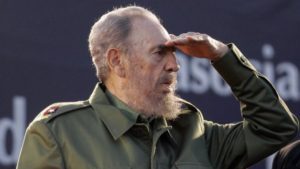 <link href="http://static.bbci.co.uk/news/1.143.0..." rel="stylesheet">
<link href="http://static.bbci.co.uk/news/1.143.0..." rel="stylesheet">Fidel Castro, pictured here in 2006, says he was not born political but his passion for politics seems unwavering "I wasn't born political" Fidel Castro once wrote. "But from very young I observed things that stuck in my mind, that helped me understand the realities of the world."
He first observed them amid the rural poverty of his birthplace, Biran.
Tucked away in the eastern province of Oriente, the main attraction in the town is his former home.
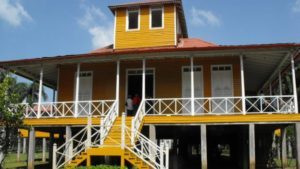
Fidel Castro's home in Biran has become a tourist attraction
<link href="http://static.bbci.co.uk/news/1.143.0..." rel="stylesheet">
Now a museum, it has been painstakingly preserved for tourists and left-wing pilgrims keen to see Castro's roots.Fidel Castro's father, Angel, was an immigrant from the Galicia region in northern Spain.Over time, he became a wealthy landowner.
Official and unofficial Castro biographers alike tend to agree that it was witnessing first-hand the exploitation of Haitian sugarcane workers on the farms that first influenced the young Fidel's fledging worldview.
Formative years
His half-brother, Martin Castro, still lives in Biran and told the BBC a few stories of their youth.
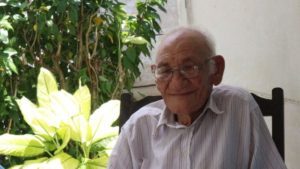
"He had a little horse called 'Careto' and would go hunting with a small rifle, that's what he enjoyed most," the 87-year-old Martin Castro recalls.
A picture of a youthful Fidel, rifle on his hip, which hangs in the family home backs up his recollection."He'd go over to the Haitians' homes and give them vouchers for credit he'd taken from our father's store," he remembers with a chuckle.
That rebellious streak eventually saw Fidel Castro sent to study under the Jesuits, first in the city of Santiago, and then in the Jesuit School of Belen in the capital, Havana. The Jesuit teachings also had a significant bearing on the young Fidel Castro.
"The Jesuit brothers didn't even earn a wage for teaching classes, they tried to be examples of modesty and honesty," says Dolores Guerra, a researcher at the government-run Cuban History Institute.
Under the influence of a priest called Father Llorente, Fidel Castro excelled in certain areas, including sports and outdoor expeditions.
At the end of his course in 1944, he was awarded a prize for discipline."He liked humanities and languages; Spanish, English and history, Ms Guerra says."But by his own admission, he wasn't a model student. He would leave everything to the last minute."Still, he did recognize the importance of discipline, punctuality and obtaining good grades."
Coming of age
Once he left the safe environment of the Jesuit boarding school, Fidel Castro studied law at Havana University.
Fidel Castro has returned to his university to give speeches to the students, as pictured here in 2010
<link href="http://static.bbci.co.uk/news/1.143.0..." rel="stylesheet">
It was as he entered the febrile, often violent world of student politics in 1940s Havana that he came of political age. In a speech he delivered in late 1947 he railed against "the country's wealth in foreign hands" and urged his fellow students to militancy saying: "a young nation can never say 'we surrender'."
It was during this period that Fidel Castro had one of his most formative political experiences not in his native Cuba but in Colombia, where he travelled in April 1948 for a Latin American youth congress.
In the few days that Fidel Castro was in the Colombian capital, Jorge Gaitan, the leader of the country's Liberal Party, was assassinated in the street outside his office.
As word spread of the murder of a leader who was emerging as a hero to many poor and disaffected Colombians, huge riots broke out on the streets of Bogota.
Fidel Castro was in the middle of them.
Key event
Tad Szulc takes up the story in his 1986 biography, Fidel - a Critical Portrait: "The Bogotazo, as that urban revolt is now known, became Fidel Castro's real baptism as a revolutionary, and had an enormous impact on him, his thinking, and his future planning."
"It was the most important single event of his life until then, and unquestionably one of his major experiences, providing him with a unique opportunity to observe an unfolding revolution, and to learn from it," argues Szulc.
Today that young student is the great survivor.
At 90 years old, Fidel Castro is one of the world's last Cold War leaders. Recently the elder statesman of Cuban politics appeared to bid the Communist Party congress goodbye.
"Soon, I'll be turning 90 years old," he told the delegates, his voice weaker but still defiant.
"It's something I'd never imagined would happen. It wasn't the fruit of any labour, but rather a whim of destiny.
"Soon I'll be like all the others; to all of us, our time must come. But the ideas of the Cuban communists will live on."
Every July, Cuba holds its annual celebration of Fidel Castro's most audacious moment: the 1953 attack on the Moncada barracks, the start of the Cuban revolution.
Though he is now retired from public life, Fidel remains the watchword for socialist hardliners, especially those who oppose recent changes on the island.
When in doubt, they turn to the man who has shaped modern Cuba more than any other and quote from his most-famous speech: "History will absolve me."
August 8, 2016
Cuba, a Country Frozen in Time
Dion Publishing presents the following article
By CARLOS MANUEL ÁLVAREZJULY 15, 2016
Havana — Never had a country appeared as old as Cuba did when it started to upgrade itself. The mad rush to develop serves only to confirm our comical, almost antediluvian backwardness. The New7Wonders Foundation, an organization that aims to preserve monuments worldwide, has just chosen Havana as a “wonder city.” In a strict sense it is, although the local residents struggle to believe it.
Hordes of inquisitive foreigners are eager to step back into historical eras that are mostly extinct in other parts of the world. There are now nonstop flights by six airlines based in the United States, and the number will only grow.
The theme park that is Cuba is an insular museum, stuck between the Iron Curtain and the industrial capitalism of the 1950s. The symbols include the already insufferable classic Chevrolets, the Singer sewing machines, the General Motors refrigerators, the Lada and Moskvitch cars, the Aurika washing machines, the matryoshka dolls, the military and party propaganda. It’s likely that not many Cubans, promised a chance to move somewhere better off, would pass up a chance to leave Cuba as it is, untouched, frozen in time, covered in soot and light, varnished with that curious and appealing patina of an era in which surviving, however, is so terribly difficult.
Those travelers who are booking tickets on state-approved nonstop flights to Cuba should be advised: “Fear not. Buy your tickets with all the calm and confidence in the world that nothing has changed.” The resources we Cubans have drawn upon to modernize ourselves, and all the good news that has transpired in the last few months since relations with the United States were renewed, have failed to alter the status quo. So there’s nothing to fear. Havana is not quite yet turning into Dubai.
For Cubans, this results in the annoying experience of being viewed as something like an exotic species. The national mood seems to contain and define us, and keeps us on a short leash.
Forget the misleading suggestions of progress: the gimmicky Chanel shows on Havana’s Paseo del Prado; the filming of the pyrotechnics for the film “Fast 8” on the city’s scorching streets (badly paved and practically unnavigable several days before); the Rolling Stones concert; or surprise visits by Usher, Katy Perry, Rihanna, the Kardashian clan. None of this is harmful in itself, but it is extremely uncomfortable when the political aristocracy’s flirting, if not downright prostitution, is set against the lack of civil liberties and the accelerated deterioration of public services.
That the cultural ambassadors of pop, rock and fashion are visiting us is an unqualified signal of our continuing to be what we are, what we have almost eternally been, not of our being something else, new and different. The first day that not a single celebrity visits us after this period of euphoria will be the first day of our new lives.
The only substantial flurry of activity in the country is in the parks and public areas where the government has created Wi-Fi hot spots so that ordinary Cubans, filled with wonder, can talk for the first time with loved ones abroad. In video chats, Cubans see the faces and recognize the features of a grandchild or sibling not seen for the longest time, before the image freezes up.
I sit in a sidewalk doorway while I log on to a park’s Wi-Fi to send this article to my editor. That park is a shameless buzz of voices that know nothing of privacy, of others’ space, of reserve, of embarrassment. There’s almost a party going on, a tiny, fun revolution. Some shout. All expose their intimate problems to anyone willing to listen — their dirty laundry, their most trivial of yearnings. The medley of shameful intimacies that families keep to themselves is available for public consumption.
On Sunday afternoons, the park again resembles — either because of the availability of Wi-Fi or in spite of it — a park at the turn of the 20th century, where townspeople would gather to talk, to court, to stretch their legs.
Last month, in his opening speech at the summit meeting of the Association of Caribbean States, held in Havana, President Raúl Castro boasted of his excellent mental and physical state at 85. Then, to eliminate any doubt of his intentions, he said that regardless of how his health was, he would hand over power on Feb. 24, 1918. That was no gaffe, as twisted minds might think. Mr. Castro did nothing but cleverly suggest the course he is charting for our country. If the historical tide prevails, and Cuba continues moving inexorably toward its past, another century of autocratic rule awaits us.
Carlos Manuel Álvarez is a Cuban journalist. This article was translated by Victoria Treviño from the Spanish.
Facing Bleak Odds, Cancer Patients Chase One Last Chance — In Cuba
National publication focused on finding and telling compelling stories about health, medicine, and scientific discovery
By Rob Waters
Mick Phillips didn’t think much about it when he started coughing a lot in the fall of 2009. He’d been doing a lot of yard work at his home in Appleton, Wis., and thought he might be reacting to leaf mold. In fact, he had stage 3 lung cancer. Though his doctors didn’t tell him this, his odds of living for five years were vanishingly small.
Chemotherapy and radiation worked for a time. But his doctor warned him each round would be less effective.
So Phillips came up with a new plan: Cuba.
Even as the US-Cuba relationship changes, bringing a growing numbers of tourists, the island remains in many ways frozen in time; when Phillips was last there in the spring, he was driven around by a cabbie in a ‘55 Buick. But a striving, modern biotech enterprise thrives in Cuba, too. It’s a legacy of the US embargo: With drugs from the US unavailable, Cuba had to develop its own pharmaceutical industry. Among its biggest accomplishments is a novel treatment for lung cancer called CimaVax.
The Cuban data on CimaVax is promising, prompting an American oncologist at Roswell Park Cancer Institute in Buffalo, N.Y., to make plans to submit an application to the Food and Drug Administration this summer for a 70-patient trial to test the drug’s safety — in what would likely be the first-ever US clinical trial of a Cuban therapy.
For now, though, CimaVax is out of reach — at least for most patients. Doctors can’t prescribe the drug in the US because it hasn’t been FDA approved. And with an embargo still in place, American patients can’t legally fly to Havana for treatment.
That did not stop Phillips.
In July 2011, two weeks after completing a second round of chemotherapy, he and his wife, Maya, boarded a plane for Lima to get CimaVax treatment in Peru, where it’s legal. Later, they’d come up with a way to sneak CimaVax into Wisconsin from Cuba.
His oncologist hadn’t heard of the drug before Phillips told him about it. Five and a half years later, he’s a believer.
Phillips, 79, is one of a small number of intrepid lung cancer patients from the US who has traveled to Cuba to get CimaVax or, more recently, a second cancer treatment called Vaxira that works in a different way.
“Outside of divine intervention, this guy shouldn’t be living right now,” Dr. Timothy Goggins said. “If you believe in God, it’s God. If you believe in science, it’s CimaVax.”
“Outside of divine intervention, this guy shouldn’t be living right now. If you believe in God, it’s God. If you believe in science, it’s CimaVax,” said Doctor Timothy Goggins.
Phillips, 79, is one of a small number of intrepid lung cancer patients from the US who has traveled to Cuba to get CimaVax or, more recently, a second cancer treatment called Vaxira that works in a different way. The patients, not all of whom have done well on the drug, share information through social media, especially a website for cancer patients.
“We find CimaVax to be incredibly exciting,” said Dr. Kelvin Lee, the Buffalo oncologist planning the US study of the treatment. “It’s inexpensive, it’s easy to give, and it has very little toxicity. And the Cubans have done a whole series of clinical trials which have shown that CimaVax increases overall survival.”
A Cuban study of 405 patients published earlier this year in the journal Clinical Cancer Research found that those who were given CimaVax lived about three months longer than those in a control group who got standard care only. More importantly, after five years, 23 percent of the patients who took the vaccine were still alive. None in the control group survived that long.
Taking a risk to beat a tough foe
CimaVax aims to mobilize the body’s immune system to fight cancer by reducing levels of epidermal growth factor, or EGF, a protein that fuels the proliferation of cells, including cancer cells. Several cancer drugs already marketed in the US — including Erbitux, Tarceva, Iressa and Tykerb — also target EGF, but in a different way. All of them cause more frequent and serious side effects than CimaVax, according to Lee.
CimaVax was approved by Cuban medical regulators in 2008 and is also approved in Venezuela and Peru, with clinical trials underway in Europe and Malaysia. Lee has made 11 trips to Cuba over the past four years to meet with scientists from the Cuban Institute for Molecular Immunology, which developed the vaccine. He calls the institute’s manufacturing facilities “world class.”
Mick Phillips had pretty modest goals when he and Maya decided to make the trip to Peru and give CimaVax a try.
His first post-chemotherapy remission had lasted 10 months before the cancer returned; his hair grew back and he returned to his job managing a company that sells and repairs industrial pumps. But Goggins, his oncologist, had warned that future remissions would be much shorter. Phillips hoped the drug would stretch them out.
Goggins didn’t tell him this part: “He probably had six months to one year [to live] at that point, depending on his response to chemotherapy. And after a recurrence, survival for five years is zero percent.”
Despite those odds, “I had no reason to think [the Cuban drug] was a good option,” Goggins said. “But they researched it and decided to do it. I don’t try and stop people from doing things like that.”
In Lima, Phillips got one round of chemotherapy and then was injected with CimaVax every two weeks — one shot in each shoulder, one shot in each hip. The treatment caused minimal side effects, mostly a mild fever and chills that once left him shaking and clutching surgical gloves filled with hot water. After two months, he and his wife, a native Peruvian, returned home with supply of CimaVax in their suitcase.
Between travel and drug costs, Phillips estimated they spent $50,000 for that first year of treatment.
Back in Wisconsin, Phillips found a nurse friend to come to his home each month to inject him with CimaVax. Meanwhile, Maya continued to do research and found that they could get the treatment in Cuba for a lot less than in Peru.
Mick Phillips has now made five trips to Havana, some with Maya, some alone, and the most recent one with his grandson. He gets treated at Centro Internacional de Salud La Pradera, a hotel-like hospital for foreign medical tourists located on the outskirts of Havana, by Dr. Ruben Elzaurdin, chief of oncology services.
On each trip, Phillips brings gel ice packs and cash — Americans can’t use ATMs or credit cards in Cuba due to the continuing embargo. At the end of each stay, he packs vials of CimaVax with the chilled gel packs into an insulated lunch box to make the trip home. He flies to Toronto, then drives 11 hours back to Wisconsin.
He does not tell US customs agents that he’s carrying medicine made in Cuba.
Phillips continues to see Goggins, who performs regular scans and has found no sign of cancer returning.
More than one way to kill a cancer cell
The idea for CimaVax was born in Havana in the 1980s.
Lee, the Buffalo oncologist, says the Cuban medication — which is called a vaccine, though it’s a treatment — is quite different from the immunology-based cancer therapies developed in the US.
At the time, scientists were unraveling the role of the EGF system, one of the key forces driving the uncontrolled proliferation of cells that occurs in cancer. They knew this proliferation is enabled when ligands — specialized molecules that circulate in the blood and other places — bind with EGF receptors on the surface of cells.
“In cancer cells you have a thousand times more EGF receptors than in normal cells. We knew that more over-expression leads to worse prognosis,” said Gisela Gonzalez, a scientist who worked on CimaVax for decades as part of a team at the Center for Molecular Immunology in Havana before moving to Miami three years ago.
Researchers around the world were looking for ways to prevent ligands and EGF receptors from binding. In the US and Europe, most targeted the receptor side of this pairing, leading to the development of so-called EGFR inhibitors, now on the market to treat certain types of breast, colon, and lung cancer.
The Cuban scientists decided to take a different tack: “We thought, ‘Why not try to block the ligand, the protein in our blood, instead of the receptor on the cells,’” Gonzalez said.
Lee, the Buffalo oncologist, says the Cuban medication — which is called a vaccine, though it’s a treatment — is quite different from the immunology-based cancer therapies developed in the US.
“Most initiate an immune response that kills cancer cells,” Lee said. “CimaVax is designed to initiate an immune response that depletes EGF out of the bloodstream.”
Although extensive testing has been done only in lung cancer, CimaVax also has the potential to be used against other EGF-dependent solid tumors, including some forms of breast, prostate, colon, and head and neck cancer, Lee said. And because it is relatively inexpensive to produce, doesn’t need to be kept frozen, and causes few side effects, it can be used in primary care clinics by family doctors, not specialists.
That also raises another possibility: that the vaccine could be used to prevent recurrence. With lung cancer screening gaining wider use, more people are going to be found with early stage cancer and will have their tumors removed.
“These people are technically cured.” Lee said, “But we know that 50 percent of them will get a second lung cancer within five years. If we could actually vaccinate those patients with CimaVax and reduce their risk of a relapse, that would be a significant step forward.”
“If we could actually vaccinate those patients with CimaVax and reduce their risk of a relapse, that would be a significant step forward,” said Dr. Kelvin Lee.
To develop CimaVax, Gonzalez and her colleagues devised a biological compound that could effectively interfere with the binding process and tested it in mice and, later, monkeys. They learned that it worked to reduce levels of EGF in the blood. And lower levels of EGF seemed to be correlated with longer survival in animals with cancer.
The first group of 10 people with lung cancer was treated in 1994 to test the safety of CimaVax. Since then, about 4,000 people have taken the drug.
The other lung cancer therapy that American patients travel to Cuba to get was jointly developed by the Center for Molecular Immunology and researchers from Buenos Aires University in Argentina and was approved in Cuba 2013. Called Vaxira, it targets a specific antigen that is attached to lung cancer cells and recruits the army of cells in the body’s immune system to attack it.
Vaxira is “completely novel and captivating,” said Dr. Thomas Rothstein, an oncologist and research scientist recently recruited to head up a new Center for Immunobiology at Western Michigan University School of Medicine.
Rothstein spent the last decade as a senior investigator at the Feinstein Institute for Medical Research in Manhasset, N.Y., and has maintained a research collaboration with a team at the CIM in Havana since 2008. He visits the country frequently.
“It’s amazing what they accomplish there, working in difficult circumstances and with limited resources,” he said.
“It’s amazing what they accomplish there, working in difficult circumstances and with limited resources,” said Dr. Thomas Rothstein.
A small number of American patients have gone to Cuba to take Vaxira. Many more have taken CimaVax. According to Gonzalez, the longest-living patient is a young man from Spain who has survived for 10 years. Mick Phillips is believed to be the longest-surviving American, a distinction he’s quite proud of.
“I’m elated that it’s done more that we ever expected it to,” Phillips said. “I think I’ll die of something different than lung cancer — probably my hard head.”
In truth, said Phillips, a lifelong smoker, the biggest threat to his health is another lung disease, COPD, which recently led to a bout of pneumonia. He has since recovered. “I’m back to doing two flights of stairs,” he said, “but not carrying a laundry basket.”
Evangelist with a cause
On Inspire, the patient social network, Phillips is a bit of an evangelist for CimaVax, sharing his experience with other cancer patients and letting them know what he learns. He knows of patients who have had poor results, including one who died about a month after getting treated.
But he’s persuaded others to gamble on Cuban medicine.
One regular reader of the website, a technology worker who asked to remain anonymous to guard his family’s privacy, was inspired by Phillips’s experience to take his mother, a retired physician from Pakistan, to Cuba. They spent a week this summer in Havana while she was treated with CimaVax.
A year of chemo with a variety of drugs had weakened his mother, who is 78. Worst, none of it seemed to reduce a fluid build-up in her lungs that made it hard to catch her breath. For the better part of the past year, she’d been having regular lung taps — a painful procedure that uses a needle through the ribs to suck fluid out of the lungs.
“They pulled a liter of fluid from her lungs every two weeks without fail,” the son said.
They left Havana with an eight-month supply of CimaVax at a cost of about $10,000 — a significant amount, but a fraction of what new cancer drugs cost in the US. Since no medical professional would agree to be liable for a drug that’s not approved in the US, the son has been giving his mother her bi-weekly injections himself.
She said he’s pretty good with a syringe. “He learned from Google,” she said.
Six days ago, she had her first lung tap since she went to Cuba. Nurses pulled out only a fraction of the amount of fluid they had in the past, her son said.
“I feel hopeful,” the mother said. “It’s better than chemo because there are no side effects. I feel better than before.”
My book has a full page feature in BOOKMAD
 check out the link http://www.xlibris.com/BookMad.aspx
check out the link http://www.xlibris.com/BookMad.aspx
August 1, 2016
Progress And Challenges In U.S.-Cuba Relations
Progress And Challenges In U.S.-Cuba Relations
U.S. And Cuban Officials Hold Third Round Of Regulatory Talks. Cuban and U.S. officials wrapped up two days of regulatory talks behind closed doors in Havana on Wednesday, the third round of such negotiations between the one-time Cold War foes amid a thaw in diplomatic ties. A Cuban Foreign Ministry statement said the discussions centered on modifications to the U.S. economic embargo made by the Obama administration and limitations that remain, as well as Cuban regulations governing commercial and financial relations. No new agreements were announced. [AP, “Cuba, US hold 3rd round of regulatory talks amid thaw,”
Cuba Must Meet Security Requirements For Flights To The U.S., As Would Any Other Country.
The head of the Transportation Security Administration said Wednesday that scheduled airline flights from Cuba wouldn’t be allowed in the U.S. until security is as tight as any other foreign airport sending flights to this country. The Transportation Department approved flights from 10 Cuban airports, with the first scheduled to arrive in September. But some lawmakers have questioned whether Cuba’s airports will meet U.S. security standards or potentially become a pipeline for bombs and terrorists. ‘Before we allow a flight to come here directly from Cuba, we will ensure that they do in fact meet all the requirements we put in place at last points of departure,’ TSA Administrator Peter Neffenger told reporters after a speech at the Woodrow Wilson International Center for Scholars.” [USA Today, “TSA says Cuba must meet security standards for flights
Cuban Policies Making Coffee Exports Difficult For The Island’s Farmers.
Cuban Policies Making Coffee Exports Difficult For The Island’s Farmers. “On April 22, the U.S. State Department added coffee to a list of products entrepreneurs within the Republic of Cuba are permitted to export to the United States. According to the U.S. State Department, those who can prove that they operate a business outside of the state sector, as well as meet a variety of other requirements pertaining to the business and its product, can sell their goods to American companies. However, Cuban policies on the exportation of goods are making it difficult for Cuban coffee farmers to utilize this change in policy. ‘There is no way,’ said Karell Acosta Gonzalez, professor for the Center for Hemispheric and U.S. Studies at the University of Havana. ‘All exports must go through state-owned companies. It’s in the Constitution.’” [InCubaToday, “Cuba making it difficult for farmers to export coffee to the U.S.,”

